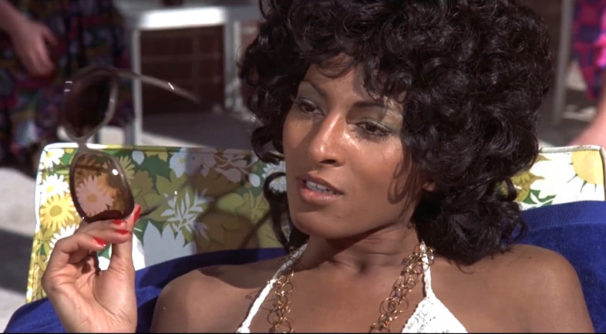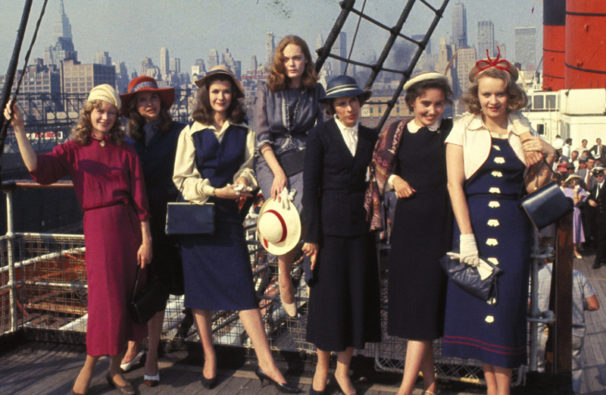
ed. note: artsmeme is pleased to have steve farber back to its team coverage of tcm fest. steve offers some of his picks for the 2022 festival.
After a full three years away, I look forward to returning to this year’s TCM Classic Film Festival . The program looks enticing. Hollywood stars and directors will be returning in person. A few personal favorites are on the program, and it will be good to see them back on the big screen. Among these are several movies conceived by women or expressing a surprising feminist sensibility. This includes several pre-Code movies from the early 1930s that offered juicy roles for sassy actresses like Barbara Stanwyck, Bette Davis, Joan Blondell, and Ginger Rogers. And there are more recent female-driven pictures like Coffy, starring Pam Grier (who will appear in person).
When I say several movies were conceived by women, readers may scratch their heads—because of course filmmakers in the so-called Golden Age were overwhelmingly male. But this overlooks the fact that some of these movies originated in novels written by women. One of them is the Festival’s big, announced restoration of the 1956 Oscar winner, Giant, based on the best-selling novel by Edna Ferber. Film Foundation board member Steven Spielberg and director George Stevens’ son, filmmaker George Stevens Jr. (the founder of the American Film Institute), will introduce the epic film which spans some 25 years of Texas history in the 20th century.

On one level Giant, which earned Stevens his second Oscar as best director, is a family story about the tempestuous marriage of a cattle rancher (Rock Hudson) and a strong-willed Eastern beauty (Elizabeth Taylor), with tensions added by a ranch hand-turned-oil tycoon (James Dean, in his final screen performance). The movie is unusual in dealing with prejudice against Mexican-Americans, a subject that had barely been addressed publicly before Ferber made it a central element in her novel. (She had also criticized prejudice against Native Americans in Cimarron and against Blacks in Show Boat.) The film highlights the prejudice and paternalism of Hudson’s Bick Benedict, as he interacts with Mexican workers on his ranch. Closer to home, he has trouble adjusting to the idea of his son (Dennis Hopper) marrying a Hispanic woman. Highly relevant themes today.
As Leslie Benedict, Taylor expresses the author’s disdain for the biases of the story’s male characters. In one of the movie’s high points, Leslie tries to enter into her husband’s conversation with his political cronies about an upcoming election, only to be told that politics is “men’s stuff.” She explodes in anger at his paternalistic prejudice, and one wonders how audiences responded to the scene back in 1956. It’s sure to generate applause this weekend at the Chinese Theatre.

Another movie based on a novel written by a woman is the film version of Mary McCarthy’s The Group, which was translated to the screen by screenwriter Sidney Buchman (Mr. Smith Goes to Washington) and director Sidney Lumet in 1966. Back in 2016 I hosted a 50th anniversary screening of the movie as a part of the Anniversary Classics series that I produce with Michael McClellan for Laemmle Theatres. Of the eight actresses who played the members of The Group—inspired by McCarthy’s classmates in the Vassar class of 1933—only four survive: Candice Bergen (who made her film debut in the picture, playing a lesbian), Joanna Pettet, Kathleen Widdoes, and Mary-Robin Redd.
The Group was a rare female-centric movie in 1966, and you won’t find many movies with eight so richly imagined female characters even today. The piece follows the graduates’ lives over a period of six or seven years, as most of their dreams are dashed. One surprising thing about the movie is that several of the characters are working women. The two main characters are Kay (Pettet), who rises in the executive ranks at Macy’s and ends up supporting her aspiring playwright husband (Larry Hagman); and Polly (Shirley Knight), who works at the local hospital. The funniest character is the bitchy Libby (Jessica Walter), who works in publishing and then at a literary agency while she tattles on her pals. The movie is an engaging mix of humor and pathos, and the entire cast is absolutely delectable. Bergen has one of the smaller roles (her character, Lakey, is off in Europe for most of the decade), but the final scene, in which she openly discusses her sexuality and gets the better of the obnoxious Hagman, was way ahead of its time. The Group overall holds up surprisingly well.
Switching gears, I would call attention to one of my favorite MGM musicals, It’s Always Fair Weather, which has one of the greatest dance numbers ever performed by Gene Kelly, a roller skating tour de force performed on a soundstage standing in for downtown Manhattan. The film’s three main characters are former wartime buddies (played by Kelly, Dan Dailey, and Michael Kidd) who meet ten years after the end of World War II and find they no longer have anything in common. The female lead, played by Cyd Charisse, is a most uncharacteristic 1950s heroine: brainy and extremely accomplished. In this case a female screenwriter did contribute to the incisive characterization. The movie was written by Betty Comden and Adolph Green, the pair who also wrote On the Town, Singin’ in the Rain, and The Band Wagon, among a number of other movies and Broadway shows.
Charisse shows off her dazzling dancing prowess in “Baby, You Knock Me Out,” a great number at Stillman’s Gym, but she’s equally impressive in her straight dramatic or comedic scenes. She plays a Barnard graduate and a TV executive, and she stands up to Kelly with poise and panache. A scene in which she effortlessly rattles off a series of boxing statistics dispels the stereotypical view of women’s pastimes. This movie mixes satire, pathos, and broad comedy with a few spectacular musical numbers (one of them performed by female co-star Dolores Gray). Catch it on the big screen if you’ve seen it before or if you haven’t ever caught it. It wasn’t as successful as the other Comden-Green musicals, though they earned an Oscar nomination for best original screenplay.
Another delightful, underseen movie screening at the Festival is the elegant 1973 murder mystery, The Last of Sheila. This is worth catching for several reasons, one of which is that it represents the only screenwriting credit by the great Stephen Sondheim. Sondheim wrote the script with actor Anthony Perkins (his only credit as a writer). The two men and a third friend, the movie’s director, Herbert Ross, often played murder mystery games, most frequently devised by Sondheim, a gifted gamester as well as a brilliant composer and lyricist. The film was probably too brainy for a mass audience; the complicated but satisfying murder plot requires close attention. But it’s a satisfying effort for fans of intricate puzzles, with a bonus of wicked Hollywood satire (probably contributed by Perkins). James Coburn, Richard Benjamin, James Mason, Dyan Cannon, Joan Hackett, Raquel Welch, and Ian McShane play the gamesters aboard a yacht in the south of France. Richard Benjamin will attend the TCM Festival for a Q&A after the screening on Saturday.
I would also recommend one screening that is more purely male-dominated: a 40th anniversary screening of Barry Levinson’s directorial debut, Diner. Four of the movie’s stars—Kevin Bacon, Steve Guttenberg, Paul Reiser, and Tim Daly—will join the discussion on Saturday night at the Hollywood Legion Theatre. This delightful reminiscence of Levinson’s youth in Baltimore in the early 1960s (he earned an Oscar nomination for his screenplay) represents a more typical example of male bonding on the screen. But it should be noted that the film does subtly criticize the male chauvinism of the characters. Guttenberg’s character insists that his fiancée pass a football quiz before he will proceed with their marriage, an act of idiocy that the film adroitly skewers.
These are among the provocative offerings at this year’s TCM festival, several parlaying some surprisingly sophisticated variations on the more typical sexual politics of Hollywood’s past.
TCM Classic Film Festival | venues around Hollywood Boulevard | Individual and Festival passes here
Stephen Farber, former president of the Los Angeles Film Critics Association, is a frequent contributor to The Hollywood Reporter and Los Angeles Times. He is the author of five books on Hollywood history. He is host of Reel Talk, presented with Landmark Theatres, and Anniversary Classics, presented with Laemmle.
